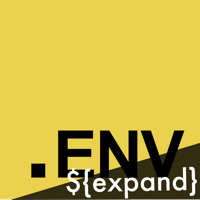Dotenv libraries are supported by the community.
Special thanks to:


Dotenv-expand adds variable expansion on top of dotenv. If you find yourself needing to expand environment variables already existing on your machine, then dotenv-expand is your tool.
# Install locally (recommended)
npm install dotenv-expand --saveOr installing with yarn? yarn add dotenv-expand
Create a .env file in the root of your project:
PASSWORD="s1mpl3"
DB_PASS=$PASSWORD
As early as possible in your application, import and configure dotenv and then expand dotenv:
var dotenv = require('dotenv')
var dotenvExpand = require('dotenv-expand')
var myEnv = dotenv.config()
dotenvExpand.expand(myEnv)
console.log(process.env)That's it. process.env now has the expanded keys and values you defined in your .env file.
You can use the --require (-r) command line option to preload dotenv & dotenv-expand. By doing this, you do not need to require and load dotenv or dotenv-expand in your application code. This is the preferred approach when using import instead of require.
$ node -r dotenv-expand/config your_script.jsThe configuration options below are supported as command line arguments in the format dotenv_config_<option>=value
$ node -r dotenv-expand/config your_script.js dotenv_config_path=/custom/path/to/your/env/varsAdditionally, you can use environment variables to set configuration options. Command line arguments will precede these.
$ DOTENV_CONFIG_<OPTION>=value node -r dotenv-expand/config your_script.js$ DOTENV_CONFIG_ENCODING=latin1 node -r dotenv-expand/config your_script.js dotenv_config_path=/custom/path/to/.envSee tests/.env for simple and complex examples of variable expansion in your .env
file.
DotenvExpand exposes one function:
- expand
expand will expand your environment variables.
const dotenv = {
parsed: {
BASIC: 'basic',
BASIC_EXPAND: '${BASIC}',
BASIC_EXPAND_SIMPLE: '$BASIC'
}
}
const obj = dotenvExpand.expand(dotenv)
console.log(obj)Default: false
Turn off writing to process.env.
const dotenv = {
ignoreProcessEnv: true,
parsed: {
SHOULD_NOT_EXIST: 'testing'
}
}
const obj = dotenvExpand.expand(dotenv).parsed
console.log(obj.SHOULD_NOT_EXIST) // testing
console.log(process.env.SHOULD_NOT_EXIST) // undefinedThe expansion engine roughly has the following rules:
$KEYwill expand any env with the nameKEY${KEY}will expand any env with the nameKEY\$KEYwill escape the$KEYrather than expand${KEY:-default}will first attempt to expand any env with the nameKEY. If not one, then it will returndefault
You can see a full list of examples here.
See CONTRIBUTING.md
See CHANGELOG.md



